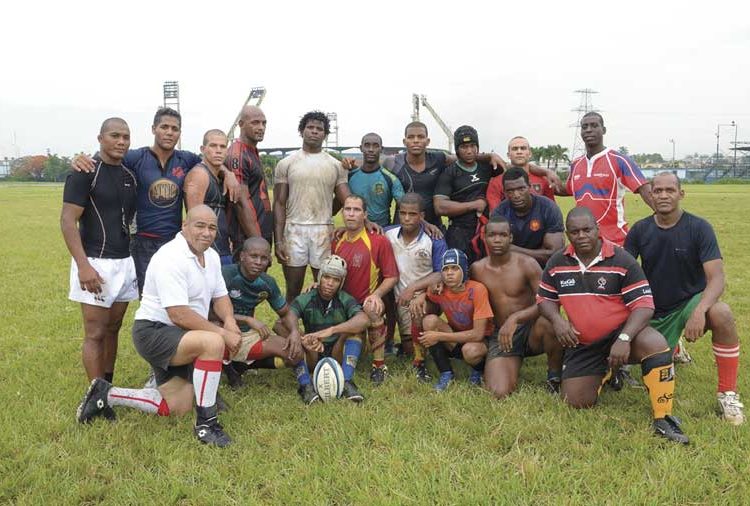Photos: Alain L. Gutiérrez
It might seem absurd that a friendship and solid brotherhood could be forged on the basis of bruises and blows. But it can, because practicing rugby brings men together and makes them into one big family.
In Cuba, there are rugby clubs in eleven provinces, but it is still not a popular sport. It is not an official sport, either; in fact, it does not have its own federation, and is considered to be just a recreational activity. Despite all of that, the quality of Cuban players has been put to the test in a number of matches, with very positive results.
Alexis Figueras Sosa, the coach for the Giraldillos Club in Alamar, Habana del Este, has been practicing rugby for twenty years. In 1992, a Spanish coach convinced a group of students to practice this sport. At the time, Alexis was studying for his degree in physical culture, specializing in handball. The Indios Caribes, a university team, was formed; years earlier, other Cuban students had competed in the same university. Rugby had come to Cuba again.
A year later, the first international game was held, with the Cayman Islands as the visiting team. The outcome was crushing: the visitors won 50-5. The only Cuban points scored were by Ernesto Tosco, with a “try,” a play in which the player uses his hands to set the ball on the opposition’s final line (in-goal area).
This game was followed by other matches against amateur teams from France, Spain, Jamaica, Argentina and Mexico.
In 1995, former French player Max Bouix of the Saint Gaudain club came to Cuba. Fascinated by the Cuban athletes, he became involved in training the Indios Caribes in technique and tactics.
Being a rugby player is synonymous with being a good brother, a good friend. At least, that is the sport’s philosophy. Players behave as if they were family, and at the end of the two regulation game periods, they traditionally devote another period to fraternizing as if they were in a bar.
To practice rugby, one must be in excellent physical condition. It is a contact sport that does not generate violence, but the dynamics of the game sometimes call that into question. Cuban competitors maintain their inter-club rivalry, but being part of the rugby community makes them more tolerant when facing tense situations as part of a game.
One player who has been at the top of the game for the last four years is Yasser Cárdenas Gordon. He is currently captain of the Giraldillos. His large build contrasts with the gentleness of his personality. Rugby has taught him to be more thoughtful. During practice, he always has a smile, even when things are going badly. Yasser has recruited many of his club’s members from among his neighborhood buddies.
Early on, he practiced discus throwing. He performed excellently in that sport, but when he became disappointed about possibilities for rising higher, he found rugby to be a way of channeling his potential.
Not long ago, rugby returned to the Olympic Games. Baseball, Cuba’s national sport, was eliminated from the Olympics. Cuban rugby still does not have its own federation. Since 2001, the Havana Sevens international rugby tournament has been held in Cuba, endorsed by the International Rugby Board. Competing teams have come from the United States, Cayman Islands, Spain, Trinidad and Tobago, Canada, Venezuela, Germany, Peru and Mexico.
The first off-island experience for Cuba’s players was in the year 2000. A team made up of players from the Giraldillos, Indios Caribes and José Martí clubs traveled to France to compete against local amateur clubs. They played eight games; they were able to tie in one, and lost the other seven. Despite that, the Cubans made a very good impression, and the following year, Leonel Baró Espinosa and Alexis Figueiras returned to France to receive training as instructors.
Every year since 2004, a na-tional championship is held in August. This year, it is being held from the 9th to the 12th in Guáimaro, Camagüey. Players receive donated equipment from other athletes who visit Cuba and learn about local interest in this sport. In a display of the spirit of this practice, members of the Havana clubs collect equipment to donate to clubs in other provinces and contribute to the growth and strengthening of that fraternity.
None of the players is professional; they all have different and find time in their busy schedules to devote several hours to rugby practice, and generally their play begins after the workday. Every Saturday, they meet religiously at Havana’s Ciudad Deportiva sports complex for competitions between clubs. Afterward, aching and sore but happy, they share rum, beer and food in their “third period.” There is an old saying that “rugby is a ruffian’s game played by gentlemen.” When you meet these athletes, it’s easier to understand the joke.










